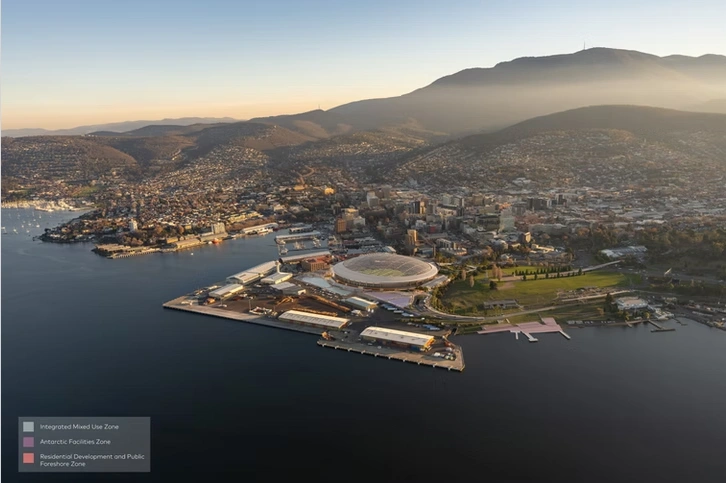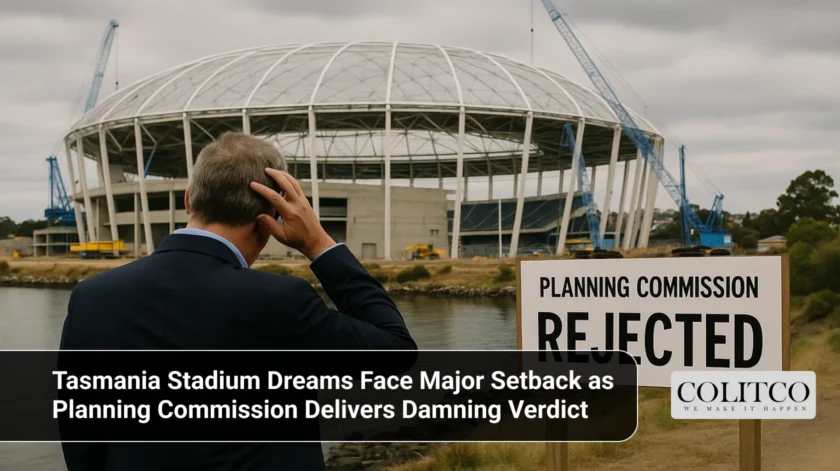Tasmania’s AFL aspirations hang in the balance after planning authorities delivered a scathing assessment of the controversial Tasmanian AFL stadium project, recommending against the billion-dollar development that threatens to saddle the state with massive debt.
The Tasmanian Planning Commission released its long-awaited final report on September 17, 2025, dealing a potentially fatal blow to the proposed 23,000-seat venue at Macquarie Point in Hobart. The commission’s expert panel concluded that the stadium’s disadvantages significantly outweigh its benefits, casting serious doubt over the future of the Tasmania Devils’ entry into the AFL.
Planning Panel Delivers Brutal Assessment
The commission’s findings paint a troubling picture of a project spiralling out of control. The panel determined that the stadium’s total capital cost would reach $1.19 billion, with $944 million to be funded by the state government. This represents a dramatic escalation from the original estimate of $715 million.
Most damaging was the commission’s economic analysis, which found the project’s benefit-cost ratio sits at just 0.53. This means Tasmanians would receive only 53 cents in benefits for every dollar spent – a devastating indictment of the project’s value proposition.
“The project represents a significant net cost and will diminish the economic welfare of Tasmanians as a whole,” the planning panel wrote in its 137-page assessment.
The commission noted that construction costs equate to approximately $5,900 for every Tasmanian household not dependent on Commonwealth income support. For a state already grappling with mounting debt, these figures represent a considerable burden on taxpayers.
Government Defiant Despite Expert Warnings
Despite the commission’s stark warnings, both major political parties remain committed to the project. Premier Jeremy Rockliff has repeatedly stated that Tasmania won’t receive an AFL team without building the stadium, a position supported by AFL chief executive Andrew Dillon.
Business and Industry Minister Eric Abetz dismissed the report’s findings, claiming it “underplays the immense benefits of the stadium and the precinct it will unlock.” The government maintains that parliament will make the final decision, regardless of the planning commission’s recommendation.
Labor opposition leader Dean Winter expressed concern that the project was “hanging by a thread” but reaffirmed his party’s support for both the stadium and the Tasmania Devils team.

Artist’s impression of the proposed Macquarie Point stadium that has divided Tasmania.
Financial Implications Spark Concern
The commission’s report highlighted severe financial risks for Tasmania. Independent economist Nicholas Gruen’s earlier analysis warned that the project displayed “hallmarks of mismanagement” and would leave Tasmania with an additional $1.8 billion in debt over ten years.
Current funding arrangements include:
- State government: $375 million
- Federal government: $240 million
- AFL contribution: $15 million
- Remaining $300+ million: State borrowings
Critics argue this funding model places an unsustainable burden on Tasmania’s finances at a time when the state’s debt is projected to double to $13 billion by 2027-28.
AFL Licence Conditions Unchanged
The AFL has maintained its hardline stance throughout the controversy. Construction of the roofed 23,000-seat venue remains a non-negotiable condition for the Tasmania Devils’ entry into the competition in 2028.
AFL agreements specify that Tasmania faces financial penalties if the stadium isn’t 50% complete by October 2027 and ready for the 2029 season. The league retains the right to terminate Tasmania’s licence if stadium funding is withdrawn.
This inflexibility has drawn criticism from federal crossbench members, including Senator Jacqui Lambie, who has repeatedly called the AFL’s demands unreasonable for a state of Tasmania’s size and economic capacity.
Political Crisis Deepens Division
The stadium controversy has created significant political instability in Tasmania. The project contributed to the collapse of the previous government’s majority and triggered the 2024 state election. Political tensions have only intensified following Jeremy Rockliff’s recent political challenges as his government faces ongoing pressure over the stadium’s viability.
Today, the Tasmanian Planning Commission has released their report on the Mac Point Stadium.
It found that concerns around transport, safety, access and noise can be successfully addressed.
Unfortunately, it still massively underestimates the social and economic benefits that…
— Jeremy Rockliff (@jeremyrockliff) September 16, 2025
Independent MPs and Greens representatives have been particularly vocal in their opposition. Eight independent and one Green upper house MPs have co-signed letters demanding renegotiation of the AFL deal, arguing that Tasmania cannot afford such massive expenditure while essential services remain underfunded.
“Tasmania’s budget is in a mess and essential services are already going underfunded,” said Greens sports spokesperson Vica Bayley. “Yet the Liberals have reconfirmed their unconditional support for a billion-dollar stadium that Tasmanians don’t need and can’t afford.”
Positive News for Northern Tasmania
While the Hobart stadium faces uncertainty, there’s encouraging progress for football infrastructure in northern Tasmania. The $200 million UTAS Stadium redevelopment in Launceston commenced major construction in September 2025, with both state and federal governments contributing $65 million each.
The UTAS Stadium upgrade will deliver:
- New Centre West Stand with premium seating and corporate facilities
- Redeveloped Eastern Stand adding 3,629 seats
- Western Stand infill seating with improved accessibility
- Enhanced patron amenities throughout the venue
This project enjoys broad support and is scheduled for completion ahead of the Tasmania Devils’ anticipated 2028 debut, providing a quality northern venue regardless of the Hobart stadium’s fate.
Community Divided on Future Direction
Public opinion polling has consistently shown weak support for the Macquarie Point stadium. A Federal Group-commissioned poll in April 2025 found strong opposition to the project, particularly regarding costs exceeding the budgeted $375 million.
Community groups like “Our Place” have organised rallies opposing the stadium, arguing that funds would be better directed toward housing, healthcare, and education. Over 200,000 Tasmanians have paid $10 each to become founding members of the Devils, demonstrating strong support for the team despite stadium concerns.
What Happens Next?
The planning commission’s report now moves to parliament for a final decision. The minority Liberal government holds 14 of 35 lower house seats and requires crossbench support to pass the necessary legislation.
Given the commission’s damning assessment and mounting public opposition, the government faces an uphill battle convincing sufficient MPs to support the project. The tight timeline adds further pressure, with construction needing to begin soon to meet AFL deadlines.
Alternative proposals, including upgrading existing venues or seeking a revised deal with the AFL, continue to circulate. However, the league has shown no willingness to compromise on its original demands.
Economic Impact Beyond Football
The stadium controversy extends far beyond sport. Tasmania’s mining and resources sector, which generates over $2.5 billion annually and supports 6,800 jobs, competes for government attention and investment with the stadium project.
Critics argue that Tasmania’s limited financial resources would be better invested in infrastructure supporting existing industries rather than subsidising elite sport. The state’s focus on critical minerals exploration and sustainable industries could be compromised by the stadium’s massive debt burden.
Also Read: BHP Cuts 750 Queensland Jobs as Royalty Burden and Weak Coal Prices Force Major Restructuring
Conclusion: A Crossroads for Tasmania
Tasmania stands at a critical juncture. The planning commission’s recommendation provides political cover for those seeking to abandon or significantly modify the stadium project. However, the potential loss of an AFL licence would devastate many Tasmanians who’ve dreamed of their own team for decades.
The coming weeks will determine whether Tasmania proceeds with a project its own planning experts have deemed economically harmful, or whether common sense prevails and alternative solutions are pursued. Either way, the decision will shape Tasmania’s financial future for generations to come.
With parliament set to debate the issue in the coming months, Tasmanians await a resolution to one of the most divisive infrastructure projects in the state’s history. The Tasmania Devils’ dream of joining the AFL may depend on finding a solution that balances sporting ambition with fiscal responsibility.












